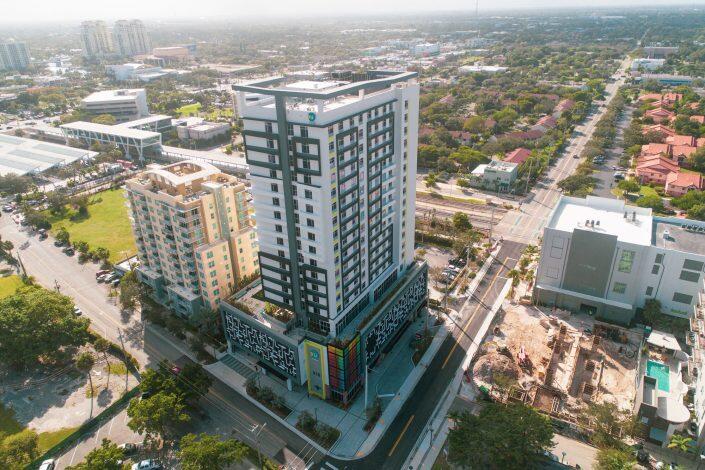This is a critical year for Opportunity Zone investors.
Real estate developers, property owners and funds have until the end of December to take full advantage of the federal tax-break program, but have also benefited from a Covid-related deadline extension. Though the coronavirus briefly paused Opportunity Zone investment nationwide, backers still poured billions into funds, enticed by the looming deadlines, rising stock market and more recently, an improving overall economy.
Individual investors who had until Dec. 31, 2020, to defer their capital gains in a Qualified Opportunity Zone Fund got a March 31 extension from the Treasury Department.
That has passed but additional deadlines remain, including one in September and another at the end of the year. Real estate attorneys and OZ experts say the rush is on to meet those cutoffs so investors can reap all the tax benefits of the government program designed to encourage development in thousands of distressed neighborhoods across the U.S.
“You bet they are rushing,” said Miami-based attorney Ronald Fieldstone, a partner at Saul Ewing Arnstein & Lehr.
Fieldstone represents developers of two branded hotels who created qualified Opportunity Zone funds in which investors have been using their capital gains to help bankroll projects. The flurry of money that came in before the March 31 deadline provided his clients’ projects with a boost.
“They have investors ready to go and a backlog of people in the loop,” Fieldstone said.
It was a similar story for attorney Stevan Pardo, who said the extended deadlines allowed two clients — developers who separately launched two Opportunity Zone funds — to increase their capital raise. Through affiliates, they are separately developing a rental complex in Miami and a branded hotel in Hawaii. Pardo, a former developer who is now a partner in Miami-based firm Pardo Jackson Gainsburg, said the additional time gave clients the chance “to accomplish what would have been difficult if not impossible” under the previous deadline.
Pardo, who leads his law firm’s hotel, construction and litigation work, said there have been more inquiries from potential OZ investors in recent months compared to earlier in the pandemic.
The Opportunity Zone fund backing the Hawaii hotel development aims to raise between $50 million and $150 million, with each investor required to ante up at least $250,000, Pardo said. The fund backing the Miami project has a fundraising goal of roughly $100 million. He’s confident both projects will reach their goals as a result of the extensions and improving economy.
Read more



Extended Opportunity
The March 31 reprieve applied to individual investors who realized capital gains from the sale of real estate, stocks or another venture from Oct. 4, 2019, through Oct. 2, 2020. Those investors originally had 180 days from when they realized gains. The deadline also applied to LLCs, partnerships and other business-related pass-through entities that realized capital gains in 2019.
Pass-through entities that realized capital gains in 2020 have until Sept. 11 to invest in qualified Opportunity Zone funds to defer taxes.
For investors to get the full 15 percent benefit of their capital gains from taxes, they would have had to invest in a qualified Opportunity Zone fund for seven years, by Dec. 31, 2019. Now, to get the 10 percent benefit, investors have until the end of 2021 to put their money in a fund for five years.
In South Florida, where real estate prices have soared along with the stock market, investors have in recent months realized higher capital gains, sending them on the hunt for tax harbors to protect those profits. Some have chosen Opportunity Zone funds, and have benefited from the extended investment deadlines.
On March 15, Coral Gables-based Driftwood Capital launched its second raise for two Opportunity Zone hotel properties. One was a dual Tru by Hilton/Home2Suites by Hilton complex in Fort Lauderdale that it co-developed, and the other was a Staybridge Suites in Wilmington, Delaware. Driftwood targeted individuals looking to reinvest their capital gains, with a minimum contribution of $50,000 each. Driftwood had planned to raise the money last year, but pushed the offerings back because of the Covid economy, said president and COO Carlos Rodriguez Jr.
Investor response has been strong, said the firm’s chief commercial officer, Alejandro Navia.
Since that launch, Driftwood has received 90 percent of the $7.4 million investment goal for the Hilton project — the remaining amount it needed. For Staybridge Suites — a conversion project — investors have contributed about half of the $10.5 million goal.
“Seeing the success of these two, we may look at continuing on the asset-by-asset syndication or we may start testing out an actual [OZ] fund in advance of selecting out a few projects,” Rodriguez said.
‘Golden handcuffs’
Opportunity Zones — part of the 2017 federal tax overhaul — was created to incentivize investment in economically overlooked neighborhoods, but critics contend it largely allows for luxury development in affluent areas. In January 2020, the Treasury Department launched an investigation into who was benefiting from the program.
As a candidate for president, Joe Biden expressed reservations about the OZ program, citing the need for stricter reporting requirements. As president, he has not addressed the issue.
Attorney Logan Gans said imposing additional limitations could dissuade some investors.
“We are not sure if projects for luxury buildings will get the same type of benefit or if there will be a change” to the existing law, said the Shutts & Bowen partner.
Numerous firms have launched Opportunity Zone funds since its inception. The program got off to a slow start in part because of unclear regulations; those rules were finalized in December 2019. And while it hasn’t been as wildly popular as at first predicted, more than $12 billion was invested in OZ funds from January through August 2020, according to data from Novogradac.
Fort Lauderdale broker Jaime Sturgis said properties in Opportunity Zones are not always an easy sell. A buyer looks at a property in an Opportunity Zone, considers using the program to help pay for upgrades but then bypasses the option, he said.
Stumbling blocks include requirements that set a minimum threshold for real estate improvements. In some cases, owners believe those would lead to “over-improving” a property, said Sturgis, founder and CEO of Native Realty.

Tru by Hilton/Home2Suites by Hilton in Fort Lauderdale
Some investors are also put off by the 10-year hold period required for the full tax benefits, he said. Those rules were laid out to ensure investment is sustained in the designated communities and not used as a short-term tax dodge. But Sturgis said some “view the Opportunity Zones as golden handcuffs.”
That was the case for developer Michael Swerdlow, who is building a 578-unit affordable housing project with a Target anchor store in Miami’s Overtown neighborhood. He decided against taking part in the program, saying the return didn’t pencil out.
“The investors are getting tax benefits, so you think that would result in a better deal for the borrower,” he said.
The Opportunity Zones program is open to a wide range of business investments but a report late last year found that most of the money had gone exclusively to real estate projects.
Inspired to invest
Miami-based PTM Partners, which focuses on Opportunity Zones investments and creates its own qualified funds, said it also reaped the benefits of the March 31 deadline extension.
The company in September launched PTM Partners Opportunity Zone Fund II, with the goal of raising $250 million by the end of this year. It’s deploying the money in multifamily projects in Miami and northern Virginia, as well as a last-mile distribution center in New York. Fund II has begun deploying capital into projects.
Six investors rushed to put their money into Fund II before the March 31 deadline, said Scott Meyer, PTM chief investment officer. He said the company “saw a significant inflow” of investment in the final week of March, but declined to say how much the fund has raised so far.
Extensions “inspire people to invest,” said Reid Thomas of NES Financial, which administers Opportunity Zone funds, EB-5 investments and 1031 tax-deferred exchanges. Thomas, the firm’s chief revenue officer, said the biggest surge from investors — particularly from Florida — was just before the new year, the previous deadline for full OZ tax benefit.
For PTM’s real estate developments, Meyer said he, CEO Michael Tillman and Chief Operations Officer Nicholas Pantuliano put their own capital gains in the funds. The trio contribute 1 percent of the capital and serve as fund general partners.
“The pandemic affected the whole economy and people weren’t comfortable making that investment in 2020,” he said. Now, Meyer added, “we definitely have seen more interest both on the fundraising side and deal flow as well. Deadlines prompt decisions.”
